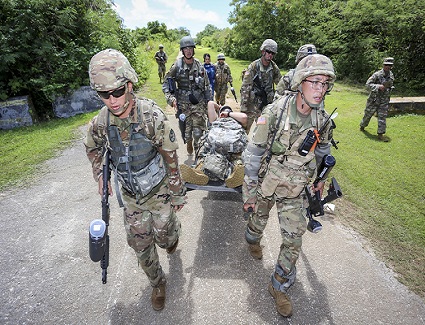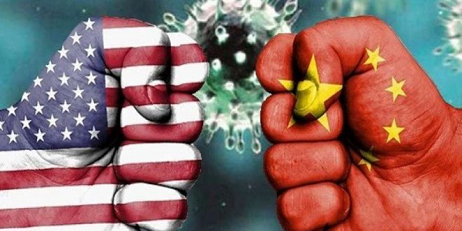Marine Corps Unit Stays Adaptable During Pandemic: Marine Corps Lance CPL. Kolby Leger

The 31st Marine Expeditionary Unit, embarked aboard the amphibious assault ship USS America to conduct naval integration training, took part in Exercise Cobra Gold 20 and supported freedom of navigation in the South and East China Seas in the spring. Amid the global spread of COVID-19, the MEU has continued training to maintain readiness and remain a dependable crisis response force for the Indo-Pacific region.
The title of the fastest crisis response force in the Indo-Pacific region is something that Marine Corps Col. Robert Brodie, the commanding officer of the 31st MEU, intends for the MEU to keep despite the new challenges presented by COVID-19.
Brodie said the virus is currently the world’s No. 1 enemy. Not only is the Marine Corps actively engaged in combating COVID-19, he added, but their family members are also doing their part on the home front.
While conducting normal operations prior to returning to Okinawa, Japan, Marines with the MEU were informed of the need to wear face masks upon their return home. In preparation for their arrival, the families of the 31st MEU went the extra mile and made more than 200 cloth masks for the Marines to minimize their risk of exposure.
“The transition from life aboard a ship, including the USS America, to Okinawa was different this time around,” Brodie said. “The spouses and Marines that have lived through the pandemic have made the transition as smooth as possible, and their hard work and dedication is directly contributing to maintaining the health and readiness of our Marines and sailors.”
To minimize the risk of exposure, Defense Department facilities, including those throughout Okinawa, have implemented the use of face masks and hand washing prior to entering their facilities, a tactic that, according to Marine Corps Gunnery Sgt. Kenyatta Ealey, the logistics chief with the 31st MEU, the unit has taken in stride.
“We are already comfortable with the rules and regulations set; we are used to being told to be ready and flexible,” Ealey said. “It’s business as usual for us.”
 The necessities of health protection are forcing units throughout the Marine Corps to be creative as they continue to work and train, and the 31st MEU is no different.
The necessities of health protection are forcing units throughout the Marine Corps to be creative as they continue to work and train, and the 31st MEU is no different.
Marines with the MEU are participating in rifle and pistol ranges as well as vehicle and aircraft maintenance while complying with the regulations put in place to prevent the spread of the virus. By wearing face masks and staying a safe distance away from one another, Marines are able to maintain their marksmanship and prepare their vehicles and equipment for future operations.
Ealey said that with all the precautions put in place, the Marines and sailors attached to the MEU just have to follow that guidance to continue to be deployable at a moment’s notice.
“The MEU’s adaptability allows it to continue to uphold the title of the Indo-Pacific’s premiere 9-1-1 force in readiness,” Ealey said. “Even during a global pandemic.”
The 31st MEU, the Marine Corps’ only continuously forward-deployed MEU, provides a flexible and lethal force ready to perform a wide range of military operations as the premier crisis response force in the Indo-Pacific region.
DOD COVID-19 Cumulative Totals
| Cases | Hospitalized | Recovered | Deaths | |
|---|---|---|---|---|
| Military | 11,770 | 290 | 5,928 | 3 |
| Civilian | 2,551 | 183 | 1,208 | 21 |
| Dependent | 1,666 | 67 | 885 | 5 |
| Contractor | 1,129 | 83 | 515 | 9 |
| Total | 17,116 | 623 | 8,536 | 38 |
As of 0700, June 29, 2020
 Army Army |
 Marine Corps Marine Corps |
 Navy Navy |
 Air Force Air Force |
 National Guard National Guard |
 DOD Agencies DOD Agencies |
|---|---|---|---|---|---|
| 3,551 | 1,162 | 3,534 | 1,366 | 1,979 | 178 |
As of 0700, June 29, 2020
Note: These figures will be updated M-W-F and are refined as the Joint Staff Crisis Management Team receives updated/corrected reporting on case numbers.


